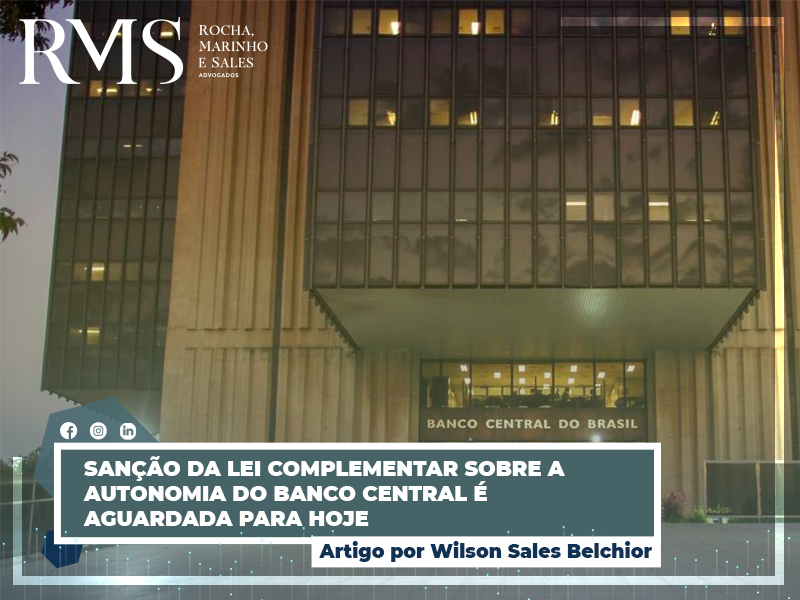
The CSLL rate is increased for financial institutions
Provisional Measure No. 1,034 / 2021, published in the Official Gazette of March 1, 2021, increased the Social Contribution on Net Income (CSLL) rate payable by...

As a result of the programmers' initiative, regulation is still incipient and related to challenges, such as, for example, keeping pace with innovations in new uses and projects. By: Wilson Sales Belchior
Cryptocurrencies are digital files that exist online and function as an “alternative currency”. They are not printed by governments or banks, but created by a complex computational process known as mining, in which the software connects users to an interconnected network of computers that function as “nodes”, being responsible for controlling, validating information and ensuring security in sharing data related to cryptocurrency. These coins, as a rule, are freely exchanged between their owners, without the intermediation of any institution that charges fees for this. They are based on a reliable system for exchanging values online, using blockchain technology, which provides a kind of decentralized “catalog” of transactions, recording each transaction, in order to avoid fraud, copies or even tracking.
As a result of the programmers’ initiative, regulation is still incipient and related to challenges, such as, for example, monitoring the speed of innovations on new uses and projects, anticipating the effective reach of these novelties, the complexity of the subject involving points of view of different specialties, difficulty inherent in the appearance of a new phenomenon in social life, due to a certain incompatibility in the attempt to fit cryptocurrencies to the existing normative paradigms.
Abroad, there is an effort by other jurisdictions to regulate the matter in two central guidelines, sometimes concomitant, taxation and normative mechanisms that combat money laundering and terrorist financing. In this sense, there is an initiative to clarify the population about the difference between the currencies that are issued and guaranteed by national states and cryptocurrencies, which are not; high volatility; personal risk of individuals who invest on their own in conjunction with the difficulty in recovering amounts resulting from losses; as well as the expansion of legislation on financial crimes to require compliance with compliance requirements for enterprises operating in this area.
In Brazil, Central Bank Communiqué No. 25,306 / 2014 fulfilled the educational role of clarifying the population regarding the risks arising from the acquisition of cryptocurrencies, differentiating them from electronic currencies, “resources stored in an electronic device or system that allow the end user to make payment transaction denominated in national currency ”(Law 12.865 / 2013), indicating, in addition, the absence of regulation or supervision by monetary authorities, inexistence of conversion guarantee, wide variation in price and potential use for illicit purposes.
Subsequently, BACEN Communiqué nº 31.379 / 2017 reiterated the warnings about the risks associated with the “purchase and storage of virtual currencies for speculative purposes”, emphasizing that its value derives exclusively from the trust conferred by people to its issuer; and CVM Circular Letter No. 01/2018 expressly stated that investment funds (art. 3) regulated in CVM Normative Instruction No. 555/2014 cannot carry out the direct acquisition of cryptocurrencies, which according to the Letter are not qualified as assets financial (art. 2, V), supporting the positioning for cyber security and custody risks related to the very nature of these cryptocurrencies.
Parallel to these technical guidelines, the Bill of Law 2303/2015 is being processed in the Chamber of Deputies, which intends to transform virtual currencies into official means of payment, entailing Central Bank supervision over operations.
Thus, it is clear that Brazil in recent years has followed the legal evolution of the discussion in a similar way to what occurred in other countries, including the publication of IN nº 1888/19 regarding the “mandatory reporting of operations carried out with crypto assets ”. First, it should be noted that the variation in nomenclature is a recurring aspect in different jurisdictions around the world, in Argentina “digital currencies”; in China “virtual commodity”; in Colombia “electronic coins”; in Mexico “virtual assets”.
This demonstrates the intense debate that is still taking place on the international scene about the legal nature of cryptocurrencies, indicating that the regulatory issue is positioned in the face of a transnational phenomenon, little studied, with apparently limited resources to proceed with the application of sanctions to those who violate norms. national legal entities.
In the Brazilian case, IN 1888/19 covers, in addition to cryptocurrencies, brokers that perform intermediation, trading or custody, in addition to individuals and legal entities, in specific cases, in the different operations that imply the transfer of these currencies, and must be informed monthly to the IRS the basic characteristics of these operations.
The reinforcement of the normative framework associated with financial crimes is creating a legal instrument of due diligence updated to the innovations experienced today, for control by the Federal Revenue of transactions involving cryptocurrencies, making progress towards regulation of the theme, which must be accompanied by the debate with civil society, aiming at security and investor protection.
Wilson Sales Belchior
Source: ClickJus website

Provisional Measure No. 1,034 / 2021, published in the Official Gazette of March 1, 2021, increased the Social Contribution on Net Income (CSLL) rate payable by...

The prediction that the presidential sanction of PLP No. 19/2019 on today's date, 23/02/2021, was announced on social networks. The wording, originating in the Federal Senate,...